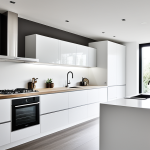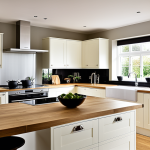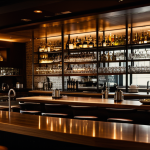Sustainable Materials for UK Kitchen Design
When selecting sustainable kitchen materials, key choices include bamboo, recycled glass, and reclaimed wood. Bamboo’s rapid renewability and strength make it ideal for cabinetry and flooring, while recycled glass offers a stunning, eco-friendly option for countertops or backsplashes. Reclaimed wood adds unique character and diverts waste from landfills.
Certification and careful sourcing ensure true sustainability. FSC-certified wood guarantees responsible forestry, minimizing environmental harm. Using low-VOC paints and finishes improves indoor air quality by reducing harmful emissions, a crucial factor in maintaining a healthy kitchen environment.
Also to see : How Are UK Kitchen Trends Shaping Home Design Choices Today?
Choosing the right materials impacts both your home and the planet. For example, recycled materials reduce reliance on virgin resources and lower carbon footprints. Eco-friendly kitchens contribute to better indoor air quality, benefiting household health. By prioritizing these elements, UK homeowners can design kitchens that are not only stylish but also environmentally responsible and safe.
Energy-Efficient Appliances and Lighting
Energy-efficient kitchen appliances play a crucial role in reducing both environmental impact and household energy costs. In the UK, appliances with high energy ratings, such as A+++ on the EU scale or the UK-specific energy label, consume significantly less power while maintaining strong performance. This efficiency is vital in an eco-friendly kitchen aiming to lower carbon footprints.
Also to see : How are UK kitchens integrating smart appliances?
Integrating LED lighting is another effective strategy. LEDs use up to 75% less energy than traditional incandescent bulbs and last substantially longer, cutting down on both electricity use and waste. The reduced heat output of LED lights also lessens cooling demands, enhancing overall kitchen sustainability.
Smart technology enhances energy savings by allowing homeowners to control appliances and lighting remotely or set schedules to minimize waste. For example, programmable ovens and refrigerators can optimize operation times, reducing unnecessary energy consumption.
Choosing energy-efficient appliances and LED lighting supports a sustainable kitchen design that aligns with both environmental concerns and practical living needs. These technologies combine efficiency with convenience, making sustainable choices accessible and effective in UK kitchens.
Integrated Recycling and Waste Management Solutions
Integrated recycling and waste management systems are essential for achieving a truly eco-friendly kitchen. Modern UK kitchens increasingly feature built-in kitchen recycling systems that simplify waste separation. These units often include designated compartments for plastics, glass, paper, and general waste, making sorting more efficient and encouraging recycling habits.
Composting is another critical component. Many designs incorporate compost bins tailored to collect food scraps, reducing landfill waste and supporting zero-waste kitchens UK initiatives. Proper composting diverts organic waste and contributes to sustainable garden practices, closing the loop on kitchen waste.
UK manufacturers lead with innovations such as odor-sealed recycling units and space-saving designs to integrate seamlessly into cabinetry. These features promote daily convenience, making responsible waste management less cumbersome.
Adopting kitchen recycling systems and composting solutions in your kitchen not only minimizes environmental impact but also aligns with broader sustainability goals. By designing kitchens around waste separation and reduction, homeowners actively contribute to cutting down landfill contributions, ensuring their kitchen is both functional and environmentally conscious.
Sustainable Materials for UK Kitchen Design
Selecting truly sustainable kitchen materials requires understanding their origins and environmental impact. Popular options include bamboo, prized for its rapid regrowth and durability; recycled glass, which reduces landfill waste while creating striking countertops; and reclaimed wood, which preserves historical character and minimizes deforestation.
Certification plays a vital role. Using FSC-certified wood ensures timber is sourced responsibly, safeguarding forests and biodiversity. Similarly, opting for low-VOC paints and finishes significantly improves indoor air quality by limiting harmful emissions, which is especially important in kitchen spaces where ventilation might be limited.
Why focus on these materials? Choosing sustainable kitchen materials directly reduces reliance on finite resources and cuts the overall environmental footprint. For example, recycled materials divert waste from landfills while lowering the need for new raw materials. Moreover, low-VOC finishes contribute to healthier living conditions by reducing airborne toxins.
In essence, informed material choices strengthen both the planet’s well-being and your household’s health, making them foundational to any successful eco-friendly kitchen design in the UK.
Sustainable Materials for UK Kitchen Design
Selecting sustainable kitchen materials is crucial for an eco-friendly kitchen that reduces environmental impact and promotes healthy living. Popular choices include recycled materials like glass, which help divert waste from landfills while offering durable and stylish surfaces. Bamboo, a fast-growing renewable resource, and reclaimed wood, which preserves historical timber, are also widely used for cabinetry and flooring.
Beyond material type, certification ensures authenticity and responsibility. FSC-certified wood verifies that timber is harvested sustainably, supporting forest conservation and biodiversity. This certification helps consumers avoid contributing to deforestation.
Using low-VOC paints and finishes is equally important since they emit fewer harmful chemicals, enhancing indoor air quality—a key factor in kitchens where ventilation may be limited. These finishes reduce exposure to toxins that can negatively affect household health.
In combination, these elements substantially lower the kitchen’s carbon footprint and toxin exposure. Choosing properly sourced and certified materials empowers UK homeowners to create kitchens that are not only stylish but also genuinely sustainable and health-conscious.
Sustainable Materials for UK Kitchen Design
Selecting sustainable kitchen materials influences a kitchen’s environmental footprint and indoor air quality significantly. Common eco-friendly options include bamboo, known for its rapid renewability; recycled glass, which repurposes waste beautifully for countertops; and reclaimed wood, salvaged to reduce deforestation while adding character.
Certification is crucial for authenticity. Choosing FSC-certified wood ensures timber is responsibly sourced, protecting forests and biodiversity. This certification also helps consumers verify sustainability claims, avoiding materials linked to environmental harm.
Meanwhile, finishes like low-VOC paints are vital to improving indoor air quality. These paints emit fewer harmful chemicals, reducing toxins in kitchens where ventilation can be limited. Their use contributes to healthier living spaces, especially important where family members spend significant time.
Together, these materials and certifications create kitchens that balance aesthetics with planetary health. By prioritizing recycled materials and certified woods paired with low-emission finishes, UK homeowners can build truly eco-friendly kitchens that minimize ecological impact while supporting well-being indoors.
Sustainable Materials for UK Kitchen Design
Sustainable kitchen materials shape both the environmental footprint and quality of an eco-friendly kitchen. Among the most valued are bamboo, recycled materials like glass, and reclaimed wood. Bamboo’s rapid growth cycle provides a renewable timber alternative, ideal for flooring and cabinetry. Recycled glass transforms landfill waste into durable, striking countertops, while reclaimed wood reduces deforestation by reusing existing timber.
Certification plays a pivotal role in verifying sustainability claims. FSC-certified wood ensures the timber is responsibly sourced, protecting forests and biodiversity. This certification is critical in confirming that kitchen materials truly support environmental stewardship rather than contributing to deforestation.
Indoor air quality also depends heavily on the finishes applied. Using low-VOC paints reduces harmful chemical emissions, essential in UK kitchens where ventilation may be limited, thereby promoting healthier indoor environments. These paints release fewer toxins compared to conventional alternatives, significantly enhancing occupant well-being.
Selecting properly sourced sustainable kitchen materials with low-emission finishes not only lowers a kitchen’s carbon footprint but also ensures safer living spaces. Such deliberate choices empower homeowners to build eco-friendly kitchens aligned with both ecological and health priorities.



